Antidepressants for people with epilepsy and depression
- PMID: 33860531
- PMCID: PMC8094735
- DOI: 10.1002/14651858.CD010682.pub3
Antidepressants for people with epilepsy and depression
Abstract
Background: Depressive disorders are the most common psychiatric comorbidity in people with epilepsy, affecting around one-third, with a significant negative impact on quality of life. There is concern that people may not be receiving appropriate treatment for their depression because of uncertainty regarding which antidepressant or class works best, and the perceived risk of exacerbating seizures. This review aimed to address these issues, and inform clinical practice and future research. This is an updated version of the original Cochrane Review published in Issue 12, 2014.
Objectives: To evaluate the efficacy and safety of antidepressants in treating depressive symptoms and the effect on seizure recurrence, in people with epilepsy and depression.
Search methods: For this update, we searched CRS Web, MEDLINE, SCOPUS, PsycINFO, and ClinicalTrials.gov (February 2021). We searched the World Health Organization Clinical Trials Registry in October 2019, but were unable to update it because it was inaccessible. There were no language restrictions.
Selection criteria: We included randomised controlled trials (RCTs) and prospective non-randomised studies of interventions (NRSIs), investigating children or adults with epilepsy, who were treated with an antidepressant and compared to placebo, comparative antidepressant, psychotherapy, or no treatment for depressive symptoms. DATA COLLECTION AND ANALYSIS: The primary outcomes were changes in depression scores (proportion with a greater than 50% improvement, mean difference, and proportion who achieved complete remission) and change in seizure frequency (mean difference, proportion with a seizure recurrence, or episode of status epilepticus). Secondary outcomes included the number of participants who withdrew from the study and reasons for withdrawal, quality of life, cognitive functioning, and adverse events. Two review authors independently extracted data for each included study. We then cross-checked the data extraction. We assessed risk of bias using the Cochrane tool for RCTs, and the ROBINS-I for NRSIs. We presented binary outcomes as risk ratios (RRs) with 95% confidence intervals (CIs) or 99% CIs for specific adverse events. We presented continuous outcomes as standardised mean differences (SMDs) with 95% CIs, and mean differences (MDs) with 95% CIs. MAIN RESULTS: We included 10 studies in the review (four RCTs and six NRSIs), with 626 participants with epilepsy and depression, examining the effects of antidepressants. One RCT was a multi-centre study comparing an antidepressant with cognitive behavioural therapy (CBT). The other three RCTs were single-centre studies comparing an antidepressant with an active control, placebo, or no treatment. The NRSIs reported on outcomes mainly in participants with focal epilepsy before and after treatment for depression with a selective serotonin reuptake inhibitor (SSRI); one NRSI compared SSRIs to CBT. We rated one RCT at low risk of bias, three RCTs at unclear risk of bias, and all six NRSIs at serious risk of bias. We were unable to conduct any meta-analysis of RCT data due to heterogeneity of treatment comparisons. We judged the certainty of evidence to be moderate to very low across comparisons, because single studies contributed limited outcome data, and because of risk of bias, particularly for NRSIs, which did not adjust for confounding variables. More than 50% improvement in depressive symptoms ranged from 43% to 82% in RCTs, and from 24% to 97% in NRSIs, depending on the antidepressant given. Venlafaxine improved depressive symptoms by more than 50% compared to no treatment (mean difference (MD) -7.59 (95% confidence interval (CI) -11.52 to -3.66; 1 study, 64 participants; low-certainty evidence); the results between other comparisons were inconclusive. Two studies comparing SSRIs to CBT reported inconclusive results for the proportion of participants who achieved complete remission of depressive symptoms. Seizure frequency data did not suggest an increased risk of seizures with antidepressants compared to control treatments or baseline. Two studies measured quality of life; antidepressants did not appear to improve quality of life over control. No studies reported on cognitive functioning. Two RCTs and one NRSI reported comparative data on adverse events; antidepressants did not appear to increase the severity or number of adverse events compared to controls. The NSRIs reported higher rates of withdrawals due to adverse events than lack of efficacy. Reported adverse events for antidepressants included nausea, dizziness, sedation, headache, gastrointestinal disturbance, insomnia, and sexual dysfunction. AUTHORS' CONCLUSIONS: Existing evidence on the effectiveness of antidepressants in treating depressive symptoms associated with epilepsy is still very limited. Rates of response to antidepressants were highly variable. There is low certainty evidence from one small RCT (64 participants) that venlafaxine may improve depressive symptoms more than no treatment; this evidence is limited to treatment between 8 and 16 weeks, and does not inform longer-term effects. Moderate to low evidence suggests neither an increase nor exacerbation of seizures with SSRIs. There are no available comparative data to inform the choice of antidepressant drug or classes of drug for efficacy or safety for treating people with epilepsy and depression. RCTs of antidepressants utilising interventions from other treatment classes besides SSRIs, in large samples of patients with epilepsy and depression, are needed to better inform treatment policy. Future studies should assess interventions across a longer treatment duration to account for delayed onset of action, sustainability of treatment responses, and to provide a better understanding of the impact on seizure control.
Trial registration: ClinicalTrials.gov NCT00026637 NCT02262156.
Copyright © 2021 The Cochrane Collaboration. Published by John Wiley & Sons, Ltd.
Conflict of interest statement
MM: none known AGM is partly funded by the National Institute for Health Research Applied Research Collaboration North West Coast (NIHR ARC NWC). A consortium of pharmaceutical companies (GSK, EISAI, UCB Pharma) funded the National Audit of Seizure Management in Hospitals (NASH) through grants paid to the University of Liverpool. SN: none known
Figures

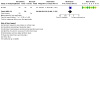
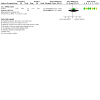

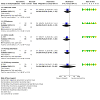

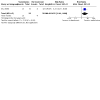


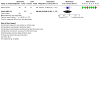
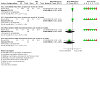
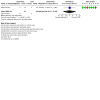
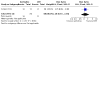

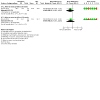
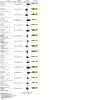

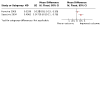
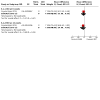

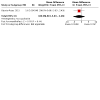
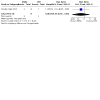
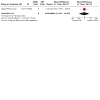
Update of
-
Antidepressants for people with epilepsy and depression.Cochrane Database Syst Rev. 2014 Dec 3;2014(12):CD010682. doi: 10.1002/14651858.CD010682.pub2. Cochrane Database Syst Rev. 2014. Update in: Cochrane Database Syst Rev. 2021 Apr 16;4:CD010682. doi: 10.1002/14651858.CD010682.pub3. PMID: 25464360 Free PMC article. Updated.
References
References to studies included in this review
Gilliam 2019 {published data only}
Hovorka 2000 {published data only}
-
- Hovorka J, Herman E, Nemcova I. Treatment of interictal depression with citalopram in patients with epilepsy. Epilepsy and Behavior 2000;1:444-7. - PubMed
Kanner 2000 {published data only}
-
- Kanner A, Kozak A, Frey M. The use of sertraline in patients with epilepsy: is it safe? Epilepsy and Behavior 2000;1:100-5. - PubMed
Kuhn 2003 {published data only}
-
- Kuhn K, Quednow B, Thiel M, Falkai P, Maier W, Elger C. Antidepressive treatment in patients with temporal lobe epilepsy and major depression: a prospective study with three different antidepressants. Epilepsy and Behavior 2003;4:674-9. - PubMed
Li 2005 {published data only}
-
- Li W, Ma D. A randomized controlled trial to evaluate the efficacy of paroxetine and doxepin in treating epileptic patients with depression. Chinese Journal of Clinical Rehabilitation 2005;9(12):20-1.
Orjuela‐Rojas 2015 {published data only}
-
- Orjuela-Rojas JM, Martinez-Juarez IE, Ruiz-Chow A, Crail-Melendez D. Treatment of depression in patients with temporal lobe epilepsy: a pilot study of cognitive behavioral therapy vs. selective serotonin reuptake inhibitors. Epilepsy & Behavior 2015;51:176-81. [DOI: 10.1016/j.yebeh.2015.07.033] [PMID: ] - DOI - PubMed
Robertson 1985 {published data only}
-
- Robertson M, Trimble M. The treatment of depression in patients with epilepsy: a double blind trial. Journal of Affective Disorders 1985;9:127-36. - PubMed
Specchio 2004 {published data only}
-
- Specchio L, Iudice A, Specchio N, La Neve A, Spinelli A, Galli R, et al. Citalopram as treatment of depression in patients with epilepsy. Clinical Neuropharmacology 2004;27(3):133-6. - PubMed
Thome‐Souza 2007 {published data only}
-
- Thome-Souza M, Kuczynski E, Valente K. Sertraline and fluoxetine: safe treatments for children and adolescents with epilepsy and depression. Epilepsy & Behavior 2007;10:417-25. - PubMed
Zhu 2004 {published data only}
-
- Zhu S, Luo L, Gui Y. Short-term efficacy of venlafaxine treating the depression in epilepsy patients. Chinese Journal of Rehabilitation 2004;19(2):101.
References to studies excluded from this review
Blumer 1997 {published data only}
Harmant 1990 {published data only}
-
- Harmant J, Van Rijckevorsel-Harmant K, De Barsy T, Hendrickx B. Fluvoxamine: an antidepressant with low (or no) epileptogenic effect. Lancet 1990;336(8711):386. - PubMed
Machado 2010 {published data only}
-
- Machado R, Espinosa A, Montoto A. Cholesterol concentrations and clinical response to sertraline in patients with epilepsy: preliminary results. Epilepsy & Behavior 2010;19:509-12. - PubMed
NCT00595699 {unpublished data only}
-
- NCT00595699. Escitalopram treatment of major depression in patients with temporal lobe epilepsy. clinicaltrials.gov/ct/show/NCT00595699 (first posted 16 January 2008).
NCT01244724 {published data only}
-
- NCT01244724. Lexapro for major depression in patients with epilepsy. clinicaltrials.gov/show/NCT01244724 (first posted 19 November 2010).
NCT03464383 {published data only}
-
- NCT03464383. Anxiety and depression in epilepsy: a treatment study [Anxiety and depression in epilepsy: a pilot epileptologist-driven treatment study]. clinicaltrials.gov/ct2/show/record/NCT03464383 (first received 7 March 2018).
References to ongoing studies
EUCTR2017‐000990‐35‐IT {published data only}
-
- EUCTR2017-000990-35-IT. Effects of the antidepressive therapy with agomelatin and escitalopram in people with depression and epilepsy [Effects of antidepressant treatment with agomelatine on patients affected by depression and epilepsy. A double blind randomized study with active control (escitalopram) with parallel groups]. www.clinicaltrialsregister.eu/ctr-search/search?query=2017-000990-35 (first posted 6 February 2019).
EUCTR2018‐003464‐32‐HU {published data only}
-
- EUCTR2018-003464-32-HU. Effect of mirtazapine on seizure frequency in epileptic patients with vagal nerve stimulation device. www.clinicaltrialsregister.eu/ctr-search/search?query=2018-003464-32 (first posted 5 November 2019).
Additional references
Adams 2008
-
- Adams SJ, O'Brien TJ, Lloyd J, Kilpatrick CJ, Salzberg MR, Velakoulis D. Neuropsychiatric morbidity in focal epilepsy. British Journal of Psychiatry 2008;192(6):464-9. [PMID: ] - PubMed
Alper 2007
-
- Alper K, Schwartz KA, Kolts RL, Khan A. Seizure incidence in psychopharmacological clinical trials: an analysis of Food and Drug Administration (FDA) summary basis of approval reports. Biological Psychiatry 2007;62(4):345-54. [PMID: ] - PubMed
APA 2000
-
- American Psychiatric Association. Diagnostic and Statistical Manual. 4th edition. Washington DC: American Psychiatric Association, 2000.
Bagdy 2007
-
- Bagdy G, Kecskemeti V, Riba P, Jakus R. Serotonin and epilepsy. Journal of Neurochemistry 2007;100(4):857-73. [PMID: ] - PubMed
Baker 1996
-
- Baker G, Jacoby A, Chadwick D. The associations of psychopathology in epilepsy: a community study. Epilepsy Research 1996;25:29-39. - PubMed
Boylan 2004
-
- Boylan LS, Flint LA, Labovitz DL, Jackson SC, Starner K, Devinsky O. Depression but not seizure frequency predicts quality of life in treatment-resistant epilepsy. Neurology 2004;62(2):258-61. - PubMed
Cotterman‐Hart 2010
-
- Cotterman-Hart S. Depression in epilepsy: why aren't we treating? Epilepsy & Behavior 2010;19(3):419-21. [PMID: ] - PubMed
Coupland 2011
Dell'osso 2013
-
- Dell'osso MC, Caserta A, Baroni S, Nisita C, Marazziti D. The relationship between epilepsy and depression: an update. Current Medicinal Chemistry 2013 Mar 15 [Epub ahead of print]. [PMID: ] - PubMed
Gilliam 2005b
-
- Gilliam FG. Diagnosis and treatment of mood disorders in persons with epilepsy. Current Opinion in Neurology 2005;18(2):129-33. [PMID: ] - PubMed
Guyatt 2008
Hamid 2013
-
- Hamid H, Kanner AM. Should antidepressant drugs of the selective serotonin reuptake inhibitor family be tested as antiepileptic drugs? Epilepsy & Behavior 2013;26(3):261-5. [PMID: ] - PubMed
Hermann 2000
-
- Hermann BP, Seidenberg M, Bell B. Psychiatric comorbidity in chronic epilepsy: identification, consequences, and treatment of major depression. Epilepsia 2000;41(Suppl 2):S31-41. [PMID: ] - PubMed
Hesdorffer 2000
-
- Hesdorffer DC, Hauser WA, Annegers JF, Cascino G. Major depression is a risk factor for seizures in older adults. Annals of Neurology 2000;47(2):246-9. - PubMed
Hesdorffer 2006
-
- Hesdorffer DC, Hauser WA, Olafsson E, Ludvigsson P, Kjartansson O. Depression and suicide attempt as risk factors for incident unprovoked seizures. Annals of Neurology 2006;59(1):35-41. [PMID: ] - PubMed
Hesdorffer 2009
-
- Hesdorffer DC, Kanner AM. The FDA alert on suicidality and antiepileptic drugs: fire or false alarm? Epilepsia 2009;50(5):978-86. [PMID: ] - PubMed
Hesdorffer 2012
-
- Hesdorffer DC, Ishihara L, Mynepalli L, Webb DJ, Weil J, Hauser WA. Epilepsy, suicidality, and psychiatric disorders: a bidirectional association. Annals of Neurology 2012;72(2):184-91. [PMID: ] - PubMed
Higgins 2011
-
- Higgins JPT, Green S, editor(s). Cochrane Handbook for Systematic Reviews of Interventions Version 5.1.0 (updated March 2011). The Cochrane Collaboration, 2011. Available from training.cochrane.org/handbook/archive/v5.1/.
Higgins 2020
-
- Higgins JP, Thomas J, Chandler J, Cumpston M, Li T, Page MJ, et al, editor(s). Cochrane Handbook for Systematic Reviews of Interventions version 6.1 (updated September 2020). Cochrane, 2020. Available from www.training.cochrane.org/handbook.
Indaco 1992
-
- Indaco A, Carrieri B, Naapi C, Gentile S, Striano S. Interictal depression in epilepsy. Epilepsy Research 1992;12:45-50. - PubMed
Jacoby 1996
-
- Jacoby A, Baker G, Steen N, Potts P, Chadwick D. The clinical course of epilepsy and its psychological correlates: finding from a U.K. community study. Epilepsia 1996;37:148-61. - PubMed
Kirkham 2010
-
- Kirkham JJ, Dwan KM, Altman DG, Gamble C, Dodd S, Smyth R, et al. The impact of outcome reporting bias in randomised controlled trials on a cohort of systematic reviews. BMJ 2010;340:c365. [PMID: ] - PubMed
Klerman 1990
-
- Klerman G. Treatment of recurrent unipolar major depressive disorder. Commentary on the Pittsburgh study. Archives of General Psychiatry 1990;47(12):1158-61. - PubMed
Kondziella 2009
-
- Kondziella D, Asztely F. Don't be afraid to treat depression in patients with epilepsy! Acta Neurologica Scandinavica 2009;119(2):75-80. [PMID: ] - PubMed
Lambert 1999
-
- Lambert M, Robertson M. Depression in epilepsy: etiology, phenomenology, and treatment. Epilepsia 1999;40(Suppl 10):s21-47. - PubMed
Lin 2012
Mendez 1986
-
- Mendez M, Cummings J, Benson D. Depression in epilepsy: significance and phenomenology. Archives of Neurology 1986;43:766-70. - PubMed
Mula 2009
Mula 2013
-
- Mula M, Kanner AM, Schmitz B, Schachter S. Antiepileptic drugs and suicidality: an expert consensus statement from the Task Force on Therapeutic Strategies of the ILAE Commission on Neuropsychobiology. Epilepsia 2013;54(1):199-203. [PMID: ] - PubMed
Preskorn 1992
-
- Preskorn SH, Fast GA. Tricyclic antidepressant-induced seizures and plasma drug concentration. Journal of Clinical Psychiatry 1992;53(5):160-2. [PMID: ] - PubMed
Sackeim 2006
-
- Sackeim HA, Roose SP, Lavori PW. Determining the duration of antidepressant treatment: application of signal detection methodology and the need for duration adaptive designs (DAD). Biological Psychiatry 2006;59(6):483-92. [PMID: ] - PubMed
Stahl 2000
-
- Stahl SM. Blue genes and the mechanism of action of antidepressants. Journal of Clinical Psychiatry 2000;61(3):164-5. [PMID: ] - PubMed
Sterne 2000
-
- Sterne JA, Gavaghan D, Egger M. Publication and related bias in meta-analysis: power of statistical tests and prevalence in the literature. Journal of Clinical Epidemiology 2000;53(11):1119-29. [PMID: ] - PubMed
Tellez‐Zenteno 2007
-
- Tellez-Zenteno JF, Patten SB, Jette N, Williams J, Wiebe S. Psychiatric comorbidity in epilepsy: a population-based analysis. Epilepsia 2007;48(12):2336-44. [PMID: ] - PubMed
Trimble 1998
-
- Trimble MR. New antiepileptic drugs and psychopathology. Neuropsychobiology 1998;38(3):149-51. [PMID: ] - PubMed
Wroblewski 1990
-
- Wroblewski BA, McColgan K, Smith K, Whyte J, Singer WD. The incidence of seizures during tricyclic antidepressant drug treatment in a brain-injured population. Journal of Clinical Psychopharmacology 1990;10(2):124-8. [PMID: ] - PubMed
Zarate 2006
-
- Zarate CA Jr, Singh JB, Carlson PJ, Brutsche NE, Ameli R, Luckenbaugh DA, et al. A randomized trial of an N-methyl-D-aspartate antagonist in treatment-resistant major depression. Archives of General Psychiatry 2006;63(8):856-64. [PMID: ] - PubMed
References to other published versions of this review
Maguire 2013
Publication types
MeSH terms
Substances
Associated data
LinkOut - more resources
Full Text Sources
Other Literature Sources
Medical
Research Materials
Miscellaneous

